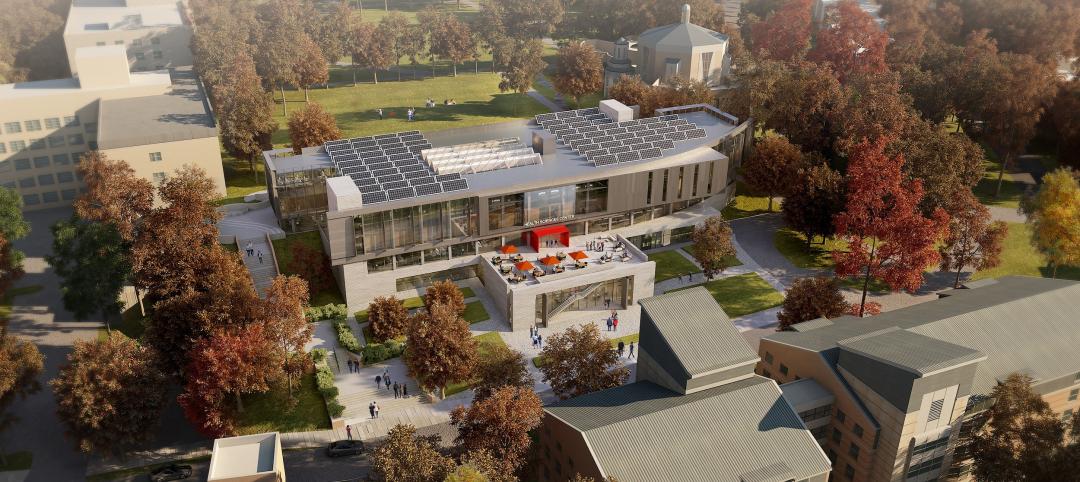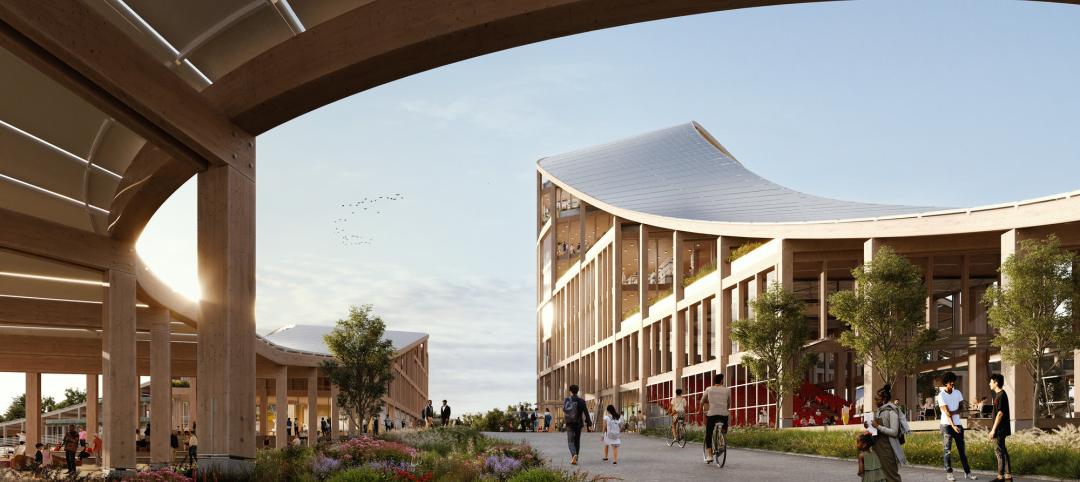Mayor Byron W. Brown announced during his 14th State of the City address that Buffalo will launch the largest Environmental Impact Bond (EIB) in the country at $30 million. The funds from this investment will allow the City of Buffalo and Buffalo Sewer Authority to capitalize on the Rain Check Buffalo program.
EIBs offer a novel approach to pay for high-impact projects based in part on the environmental, social, and/ or economic outcomes they generate. In this way, EIBs can help hedge the performance uncertainty that some developers new to green infrastructure may have, and capitalize on the multiple benefits of innovative projects like green infrastructure.
Buffalo will become the first city where an EIB is used to capitalize on a green infrastructure incentive program, in the form of the Rain Check 2.0 Grant Program, which targets the deployment of green infrastructure on private properties with large amounts of impervious surfaces. These private properties form a key component of the Buffalo Sewer Authority’s goal of using green infrastructure to manage over 500 acres of impervious surface area to help eliminate the effects of combined sewer overflows (CSOs) on Buffalo’s waterways. However, unlike projects on public property, incentives are required for private property owners to agree to install and maintain green.
“The City of Buffalo, will become the first in the nation to use an EIB to provide property owners the ability to fund green infrastructure projects and help to make our community more resilient to the impacts of climate change” said Mayor Byron W. Brown. “My administration does not view individual projects as activities in isolation, and instead views them as part of a network that functions as a system-wide improvement to our city’s water system.”
The City of Buffalo and the Buffalo Sewer Authority were selected as the winner of the Great Lakes Environmental Impact Bond Challenge through the P3GreatLakes Initiative by Quantified Ventures and Environmental Consulting & Technology, Inc. (ECT). Along with the support of the Ralph C. Wilson, Jr. Foundation and the Community Foundation of Greater Buffalo, the City of Buffalo has created a public- private, and philanthropic partnership to tackle our stormwater challenge, ensure that our city’s waterways, are protected, and guarantee a more resilient Buffalo.
In its work in Buffalo, Quantified Ventures will build on its previous successes structuring green infrastructure EIBs in cities like Washington, DC, which was also based around CSO issues and the cost-effectiveness of green vs. grey infrastructure to address them, and Atlanta, which was based around the local impacts of green infrastructure in mitigating flooding and providing access to greenspace and workforce development opportunities in underserved neighborhoods.
“Cities face massive stormwater challenges as they respond to a changing climate. Nature-based solutions reduce urban flooding risk and CSOs, and the EIB reduces Buffalo’s financial risk,” said Eric Letsinger, CEO, Quantified Ventures. “It’s a winning combination!"
Like DC and Atlanta, Buffalo will also seek to incorporate economic and community goals as part of the Rain Check 2.0 program, and the EIB used to capitalize it. “We want to see the city transformed at the end of this process, in terms of stormwater management, equity, and innovation,” said Oluwole McFoy, General Manager of the Buffalo Sewer Authority. “Our Rain Check 2.0 Opportunity Report along with this EIB allows us to invest in our neighborhoods, increase green jobs and economic prosperity for our residents while directly addressing climate change.”
“Our foundation is excited to support the implementation of the City of Buffalo’s Rain Check 2.0 program,” said Jim Boyle, Vice President of Programs and Communications for the Ralph C. Wilson Jr. Foundation. “These types of projects provide sustainable solutions that can reduce flooding, improve water quality and have a wide range of economic, environmental and public health benefits. Proactively incorporating these types of solutions in new developments, as well as the Ralph C. Wilson Jr. Centennial Park, highlight the City of Buffalo’s strategic approach to address some of the effects of climate change.”
“We deeply appreciate our project sponsors, namely the Ralph C. Wilson, Jr. Foundation, Community Foundation for Greater Buffalo, and of course, the Great Lakes Protection Fund, for their support. Their contribution will enable more than a hundred-fold investment in climate-resilient infrastructure in the region,” says Sanjiv Sinha, PhD., Water Resources National Director, Senior Vice President at ECT. “Buffalo joins a growing number of cities leveraging the EIB as a means to gain access to an emerging field of impact investors who seek not only financial returns, but also measurable environmental impact.”
Related Stories
K-12 Schools | May 25, 2023
From net zero to net positive in K-12 schools
Perkins Eastman’s pursuit of healthy, net positive schools goes beyond environmental health; it targets all who work, teach, and learn inside them.
Mass Timber | May 23, 2023
Luxury farm resort uses CLT framing and geothermal system to boost sustainability
Construction was recently completed on a 325-acre luxury farm resort in Franklin, Tenn., that is dedicated to agricultural innovation and sustainable, productive land use. With sustainability a key goal, The Inn and Spa at Southall was built with cross-laminated and heavy timber, and a geothermal variant refrigerant flow (VRF) heating and cooling system.
Sustainable Design and Construction | May 23, 2023
Hord Coplan Macht names Ilijana Soldan as Sustainability Manager
Hord Coplan Macht, Baltimore, MD., has promoted Ilijana Soldan, AIA, LEED AP, EcoDistricts, NCARB, to Sustainability Manager.
Office Buildings | May 15, 2023
Sixteen-story office tower will use 40% less energy than an average NYC office building
This month marks the completion of a new 16-story office tower that is being promoted as New York City’s most sustainable office structure. That boast is backed by an innovative HVAC system that features geothermal wells, dedicated outdoor air system (DOAS) units, radiant heating and cooling, and a sophisticated control system to ensure that the elements work optimally together.
Sustainability | May 11, 2023
Let's build toward a circular economy
Eric Corey Freed, Director of Sustainability, CannonDesign, discusses the values of well-designed, regenerative buildings.
Headquarters | May 9, 2023
New Wells Fargo development in Texas will be bank’s first net-positive campus
A new Wells Fargo development in the Dallas metroplex will be the national bank’s first net-positive campus, expected to generate more energy than it uses. The 850,000-sf project on 22 acres will generate power from solar panels and provide electric vehicle charging stations.
Senior Living Design | May 8, 2023
Seattle senior living community aims to be world’s first to achieve Living Building Challenge designation
Aegis Living Lake Union in Seattle is the world’s first assisted living community designed to meet the rigorous Living Building Challenge certification. Completed in 2022, the Ankrom Moisan-designed, 70,000 sf-building is fully electrified. All commercial dryers, domestic hot water, and kitchen equipment are powered by electricity in lieu of gas, which reduces the facility’s carbon footprint.
University Buildings | May 5, 2023
New health sciences center at St. John’s University will feature geothermal heating, cooling
The recently topped off St. Vincent Health Sciences Center at St. John’s University in New York City will feature impressive green features including geothermal heating and cooling along with an array of rooftop solar panels. The geothermal field consists of 66 wells drilled 499 feet below ground which will help to heat and cool the 70,000 sf structure.
Mass Timber | May 3, 2023
Gensler-designed mid-rise will be Houston’s first mass timber commercial office building
A Houston project plans to achieve two firsts: the city’s first mass timber commercial office project, and the state of Texas’s first commercial office building targeting net zero energy operational carbon upon completion next year. Framework @ Block 10 is owned and managed by Hicks Ventures, a Houston-based development company.
Mass Timber | May 1, 2023
SOM designs mass timber climate solutions center on Governors Island, anchored by Stony Brook University
Governors Island in New York Harbor will be home to a new climate-solutions center called The New York Climate Exchange. Designed by Skidmore, Owings & Merrill (SOM), The Exchange will develop and deploy solutions to the global climate crisis while also acting as a regional hub for the green economy. New York’s Stony Brook University will serve as the center’s anchor institution.

















